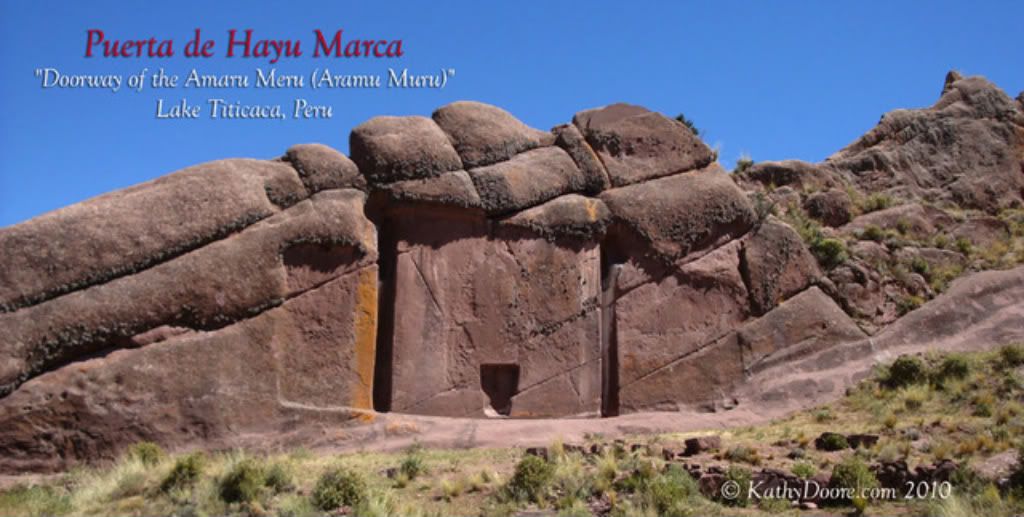Post by theshee on Mar 30, 2011 8:54:20 GMT 10
Sory if this has already been posted. I couldn't find it 

The Gate of the Gods, or the "Puerta de Hayu Marca" has been at some time in the distant past carved out of a natural rock face and in all measures exactly seven meters in height by seven meters in width with a smaller alcove in the centre at the base, which measures in at just under two meters in height.
This huge mysterious door-like structure in the Hayu Marca mountain region of Southern Peru near Lake Titicaca, lies 35 kilometres from the city of Puno and is found in an area which has long been revered by local indians as the "City of the Gods." Although no actual city has ever been discovered, the area is known as a Spirit Forest, or Stone Forest, made of strange rock formations that resemble buildings, people, and other artificial structures (Simulacrum). The door or the "Puerta de Hayu Marca" (Gate of the Gods) has been, at some time in the distant past, carved out of a natural rock face and in all, measures exactly 23' in height and width, with a smaller alcove in the centre at the base which measures in at just under 6' in height.
Jose Luis Delgado Mamani stumbled across the structure in 1996 while trekking through the surrounding foothills trying to familiarize himself with the area as his job is as a guide for mountaineering tourists. "When I saw the structure for the first time, I almost passed out..." said Mamani in an interview with the local press.
The native Indians of the region had a legend that spoke of "a gateway to the lands of the Gods", and in that legend, it was said that in times long past great heroes had gone to join their gods, and passed through the gate for a glorious new life of immortality, and on rare occasions those men returned for a short time with their gods to "inspect all the lands in the kingdom" through the gate.
The small circular depression in the centre is said to be the place where a golden disk was placed.

Another legend tells of the time when the Spanish Conquistadors arrived in Peru and looted gold and precious stones from the Inca tribes. According to one legend an Incan priest of the Temple of the Seven Rays named Amaru Meru (Aramu Muru) fled from his temple with a sacred golden disk known as "the key of the gods of the seven rays", and hid in the mountains of Hayu Marca. He eventually came upon the doorway which was being watched by shamen priests. He showed them the key of the gods and a ritual was performed with the conclusion of a magical occurrence initiated by the golden disk which opened the portal, and according to the legend blue light did emanate from a tunnel inside. The priest Amaru Meru handed the golden disk to the shamen and then passed through the portal "never to be seen again". Archeologists have observed a small hand sized circular depression on the right hand side of the small entranceway, and have theorized that this is where a small disk could be placed and held by the rock.
It has been observed that the structure superficially resembles the Gate of the Sun at Tiwanaku (Tiahuanaco). It is also said to be aligned by five other archaeological sites which together form an imaginary cross with straight lines crossing each other exactly at the point where the plateau and Lake Titicaca are located.
The Gate of the Sun, Tiahuanaco.

www.ancient-wisdom.co.uk/perugateofthegods.htm


The Gate of the Gods, or the "Puerta de Hayu Marca" has been at some time in the distant past carved out of a natural rock face and in all measures exactly seven meters in height by seven meters in width with a smaller alcove in the centre at the base, which measures in at just under two meters in height.
This huge mysterious door-like structure in the Hayu Marca mountain region of Southern Peru near Lake Titicaca, lies 35 kilometres from the city of Puno and is found in an area which has long been revered by local indians as the "City of the Gods." Although no actual city has ever been discovered, the area is known as a Spirit Forest, or Stone Forest, made of strange rock formations that resemble buildings, people, and other artificial structures (Simulacrum). The door or the "Puerta de Hayu Marca" (Gate of the Gods) has been, at some time in the distant past, carved out of a natural rock face and in all, measures exactly 23' in height and width, with a smaller alcove in the centre at the base which measures in at just under 6' in height.
Jose Luis Delgado Mamani stumbled across the structure in 1996 while trekking through the surrounding foothills trying to familiarize himself with the area as his job is as a guide for mountaineering tourists. "When I saw the structure for the first time, I almost passed out..." said Mamani in an interview with the local press.
The native Indians of the region had a legend that spoke of "a gateway to the lands of the Gods", and in that legend, it was said that in times long past great heroes had gone to join their gods, and passed through the gate for a glorious new life of immortality, and on rare occasions those men returned for a short time with their gods to "inspect all the lands in the kingdom" through the gate.
The small circular depression in the centre is said to be the place where a golden disk was placed.

Another legend tells of the time when the Spanish Conquistadors arrived in Peru and looted gold and precious stones from the Inca tribes. According to one legend an Incan priest of the Temple of the Seven Rays named Amaru Meru (Aramu Muru) fled from his temple with a sacred golden disk known as "the key of the gods of the seven rays", and hid in the mountains of Hayu Marca. He eventually came upon the doorway which was being watched by shamen priests. He showed them the key of the gods and a ritual was performed with the conclusion of a magical occurrence initiated by the golden disk which opened the portal, and according to the legend blue light did emanate from a tunnel inside. The priest Amaru Meru handed the golden disk to the shamen and then passed through the portal "never to be seen again". Archeologists have observed a small hand sized circular depression on the right hand side of the small entranceway, and have theorized that this is where a small disk could be placed and held by the rock.
It has been observed that the structure superficially resembles the Gate of the Sun at Tiwanaku (Tiahuanaco). It is also said to be aligned by five other archaeological sites which together form an imaginary cross with straight lines crossing each other exactly at the point where the plateau and Lake Titicaca are located.
The Gate of the Sun, Tiahuanaco.

www.ancient-wisdom.co.uk/perugateofthegods.htm



 I done a search too! Yeah fasinating stuff.
I done a search too! Yeah fasinating stuff.
 Happy New Years Everybody!!!
Happy New Years Everybody!!!
